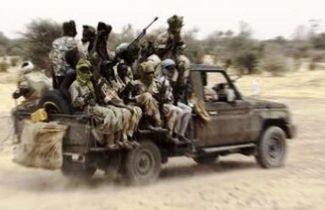Rebellion is declining in Darfur, says Sudan’s defence minister
April 15, 2014 (KHARTOUM) – The Sudanese defence minister, Abdel-Rahim Mohamed Hussein, announced that rebellion in Darfur has receded, stressing the start of military operations in South Kordofan state.

He emphasised that the rest of Darfur region is free of rebellion but acknowledged that tribal conflicts negatively affect stability of several states in the restive region.
Last Week, the United Nations expressed concern over the escalation of violence in Darfur and its impact on civilians and relief efforts.
The UN Resident Coordinator and Humanitarian Coordinator in Sudan Ali Al-Za’atari told Sudan Tribune in an interview that the killings in Darfur must be stopped, describing the situation there as “too troubled”.
Also, the head of Darfur Regional Authority (DRA), Tijani El-Sissi warned against the rapidly deteriorating security situation in North and South Darfur states and said that insecurity in North and South Darfur hampers the implementation of peace and development projects.
Following the closed-door session, several MPs said the defence minister told them that the Chadian government embarked on withdrawing its troops participating in the joint force from Darfur.
Hussein defended the Rapid Support Forces (RSF) militia which is accused by international organisations and rights groups of committing crimes against civilians and burning villages in Darfur, saying the RSF is a highly disciplined and professional force.
He denied that RSF attacked any village in Darfur, saying the ordinary citizens are satisfied with their activities because they often assist them and offer services.
Last March, the head of Darfur’s joint peacekeeping mission (UNAMID), Mohamed Ibn Chambas, slammed in a speech he delivered at Um Jaras peace forum the attacks by SRF militia on camps for internally displaced persons (IDPs) in Darfur.
The SRF militia, which is widely known as the Janjaweed militias, were originally mobilised by the Sudanese government to quell the insurgency that broke out in Sudan’s western region of Darfur in 2003.
That counter-insurgency campaign, which mainly targeted ethnic groups on account of their affiliation to the insurgents, has led to the death of approximately 300,000 people and the displacement of more than 2.7 million, according to United Nation figures.
The militia was activated and restructured again in August last year under the command of the National Intelligence and Security Services (NISS) to fight rebel groups in Darfur region, South Kordofan, and Blue Nile states following joint attacks by Sudanese Revolutionary Front (SRF) rebels in North and South Kordofan in April 2013.
The defence minister told the parliament that the Decisive Summer military campaign against the rebel Sudan People’s Liberation Movement-North (SPLA-N) in the Nuba Mountain has begun.
Last week, the director of NISS, Mohamed Atta, announced that units of SRF militia were deployed in South Kordofan state to take part in the military operations.
Regarding the security arrangements with South Sudan, Hussein said they are waiting to receive South Sudan’s approval for determining the baseline for the demilitarised security zone (zero line) according to the border map proposed by the African mediation.
He further said they are waiting to receive South Sudan’s acceptance for the formation of the administrative council, legislative council, and police in Abyei area.
The defence minister further denied recent reports that Sudanese army is pursuing rebels inside South Sudan’s territory, saying they have no interest in crossing borders and moving troops towards the south.
In September of 2012, both Sudan and South Sudan signed a series of cooperation agreements, which covered oil, citizenship rights, security issues, banking, border trade among others.
In March of 2013, the two countries signed an implementation matrix for these cooperation agreements.
(ST)
